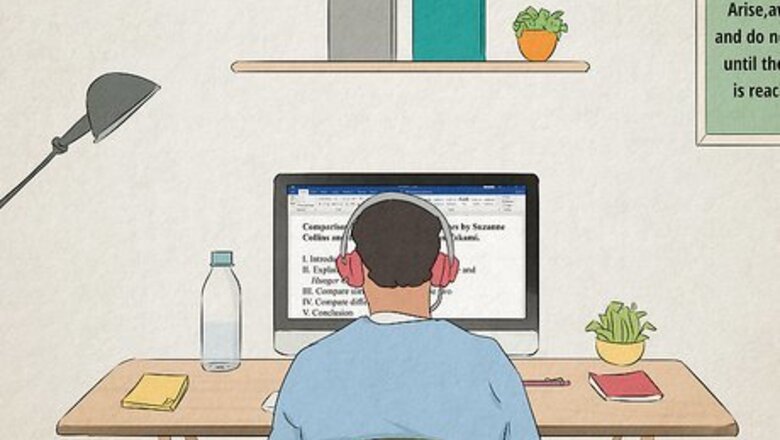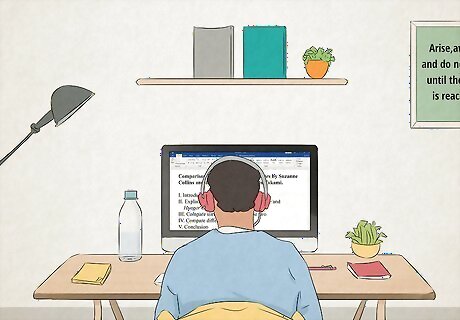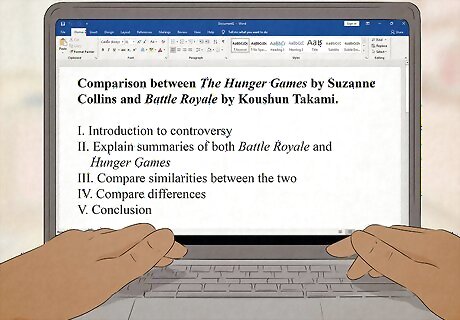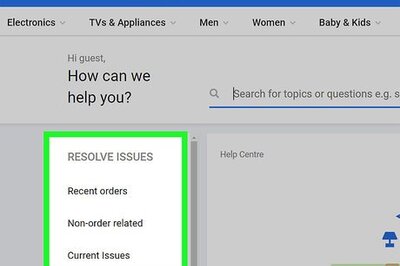
views
Change up your study space.

Your grades might be suffering because of your study style. Everybody has their own way to study—some people like some music in the background while some need it to be totally quiet, for instance. If you're having trouble retaining what you're learning, switch up your study area and see if that makes a difference! Try studying in a different room, for instance, or head to the library and see if you prefer that. Pay attention to what distracts you while you're studying. Do you find yourself shifting in your chair a lot? It might help if you move to the couch. Does your sister always try to talk to you while you're doing your homework? You might ask your mom if you can lock your door while you study. You need to have a productive environment to study in. Your study environment should be free of distractions, so turn off your cell phone, clear your desk, and ask your friends or family member to respect your space. In general, it's best to keep your study area consistent from day-to-day, but it's okay to change things up while you're figuring out what works best for you.
Try new learning strategies.

Mix up how you see, hear, and process what you're studying. When you're tackling something new, for instance, you might start by reading the chapter to yourself, then read it again out loud. Then, you might follow that by writing a summary of the text or creating flash cards. That way, your brain can process the information in a variety of different ways, and it might be easier for you to remember it. Educators used to think that people tend to have one learning style that works best for them—that you might be more of an auditory, visual, or kinetic learner, for instances. However, we now know that most students learn best by seeing information in a variety of different ways!
Rewrite your notes each night.

Copying them again will help you remember what you learned. Take some time after school to read through the notes you took that day. Write them out again, expanding any shorthand and filling in any concepts you might need to remember later. Keep your expanded notes in a separate notebook, then use this notebook as a detailed study guide when you're studying for your exams. Try to connect what you learned that day to things you've already learned. Making these connections will help you really understand the topic on a deeper level. If you have any questions, write them in your notes as well. Then, go back and try to find the answers in your textbook. If you can't find them, bring them to class the next day and ask your teacher.
Don't cram for tests.

Study a little at a time throughout the semester, instead. It can be hard to motivate yourself to study for a test way in advance—especially if you feel nervous about the material. However, procrastinating is only going to make it worse. Once you've finished rewriting your notes and doing your homework each evening, spend a little extra time reviewing what you've already learned during the school term. That way, you'll keep everything fresh in your mind, and preparing for exams won't be so overwhelming. Try making your study time interactive by making flash cards, taking practice quizzes, or using mnemonic devices to help you memorize tricky lists.
Take breaks while you're studying.

Get up and move around at least once an hour. When you're studying, at some point all that information can start to feel like it's running together. You might feel like you need to push through instead of taking a break, but in fact, your brain needs a little bit of time to process what you've learned! Set a timer or keep an eye on the clock, and every 50 minutes or so, get up and move around for about 10 minutes. This is a great time to get a snack and do some stretching!
Take your time during exams.

Read through each question carefully. Take a few deep breaths to steady your nerves before you get started. Then, read through the test. If you aren't sure you'll have time to finish the whole thing, go through and answer the questions you're most confident about first. Then, go back and take your time answering as many of the remaining questions as possible. Don't let nerves get the best of you when it comes to exam time—you've been preparing for this! If any of the questions seem confusing, ask your teacher for help!
Practice writing organized essays.

This can help if exams are bringing your grade down. If you find it easy to recall things like dates and definitions but you really struggle with essay questions, you may need to think more about how to organize them. Spend about 5 minutes sketching out a quick outline—focus on 2-3 main points, and include a few details to support each of those points. Then, stick closely to your outline as you answer the question so you don't go off-topic. Essay questions can account for a huge part of your exam score in some classes, so it's worth taking the time to improve them! Try finding a few sample essay questions online or in your textbook and answer them on your own time to get comfortable with them before your test starts.
Always do your homework and turn it in on time.

Make time every night for homework, even if you're busy. Homework can make up a big part of your grade—and that's not the only reason it's important. Doing your homework helps reinforce what you learned during class, so it can actually help you improve your grades on things like quizzes and tests. In some classes, you can actually end up with a failing grade for not turning in your homework, even if you get good grades on your exams. Make sure to do any assigned reading, as well. That can make it a lot easier to understand what your teacher is talking about in class. EXPERT TIP Joseph Meyer Joseph Meyer Math Teacher Joseph Meyer is a High School Math Teacher based in Pittsburgh, Pennsylvania. He is an educator at City Charter High School, where he has been teaching for over 7 years. Joseph is also the founder of Sandbox Math, an online learning community dedicated to helping students succeed in Algebra. His site is set apart by its focus on fostering genuine comprehension through step-by-step understanding (instead of just getting the correct final answer), enabling learners to identify and overcome misunderstandings and confidently take on any test they face. He received his MA in Physics from Case Western Reserve University and his BA in Physics from Baldwin Wallace University. Joseph Meyer Joseph Meyer Math Teacher When doing practice problems, promptly check to see if your answers are correct. Use worksheets that provide answer keys for instant feedback. Discuss answers with a classmate or find explanations online. Immediate feedback will help you correct your mistakes, avoid bad habits, and advance your learning more quickly.
Keep your schoolwork organized.

It's hard to learn when you're surrounded by clutter. Use folders and binders to keep all of your schoolwork organized, and place them in the same spot every day. That way, you'll never lose points because you lost your homework. Also, use a calendar or planner to keep track of due dates and exams. Staying organized extends to your work space as well. Keep your desk clear so you won't be surrounded by distracting clutter.
Pay attention in class.

Do your best not to get distracted when your teacher is talking. This can be tough sometimes, but listening during class is one of the very best ways to really learn the material. Be engaged, too—take good notes, participate in discussions, and ask questions if you don't understand something. When you're taking notes, don't just write down everything the teacher says. Instead, you might jot down things like key concepts, vocab words and their definitions, and a few examples. And be sure to write neatly so you can re-read what you wrote! Especially pay attention to anything your teacher mentions more than once—there's a good chance that's something important, and you might be tested on it later! Try not to miss any classes, either—you probably won't get good grades if you skip class a lot. If you take online classes, log in at least once a day. In some classes, attendance is actually part of your grade!
Snack throughout the day.

Keep your physical and mental energy high. You might have noticed that it's harder to concentrate when you're hungry—and that's not just your imagination! In fact, simply skipping breakfast can make you less alert, affect your attention span, and make it harder to process complex subjects. To make sure you're performing at your best, eat regular meals and healthy snacks throughout the day. For instance, you might have a bowl of oatmeal for breakfast, an apple for a mid-morning snack, a sandwich and carrots for lunch, and cheese crackers in the afternoon. Most teachers won't let you eat in the classroom, but you may be able to keep snacks in your backpack or locker so you can fuel up between classes.
Get enough sleep at night.

Go to bed and wake up at the same time every day, if you can. Sleep might not seem like that big of a deal, but it can actually have a huge impact on your grades. If you're tired in class, it's almost impossible to pay attention to what your teacher is saying. And if you're studying while you're sleepy, you won't retain nearly as much of the information, so it will be harder to recall it when you start taking tests. Sometimes it's hard to get enough sleep at night, especially if you have to work after school or your family makes a lot of noise. Sticking to a regular schedule will help you fall asleep quickly at bedtime, and the consistency will lead to better sleep overall.
Start a study group with your friends.

Some people learn best in small groups. Pick a time when everyone can meet up, then go over your notes together. This can be really helpful, because it gives you a chance to see what everyone thought was important—if you all wrote down the same thing, it's probably really important. However, someone might have picked up on a detail that you missed, which can help make your study notes even stronger. Work together to come up with ways to remember key concepts, definitions, and other information that might be on your tests. You can even quiz each other to see how well you remember what you've learned! Just make sure you pick friends who have the same goals as you—a study group only works if you're willing to actually spend the time reviewing the course material.
Talk to your teacher about your grades.

Reach out as soon as you feel like you're falling behind. Be honest with your teacher about why you think you're not doing well in their class—maybe something outside of school is affecting your focus, or maybe you've been struggling with the material. Whatever the reason, take full responsibility for it. Then, ask your teacher if there's anything you can do to bring up your grade, like retaking a test or turning in extra credit or missed assignments. Try asking your teacher if they have any suggestions for how you might do better in their class—they might be able to recommend some study guides or extra homework that will help you understand the material better. Even if your teacher won't allow you to do any extra work to improve the grade you've already gotten, assure them that you're going to make an extra effort to do better for the rest of the term. Then, follow through with that promise! EXPERT TIP Joseph Meyer Joseph Meyer Math Teacher Joseph Meyer is a High School Math Teacher based in Pittsburgh, Pennsylvania. He is an educator at City Charter High School, where he has been teaching for over 7 years. Joseph is also the founder of Sandbox Math, an online learning community dedicated to helping students succeed in Algebra. His site is set apart by its focus on fostering genuine comprehension through step-by-step understanding (instead of just getting the correct final answer), enabling learners to identify and overcome misunderstandings and confidently take on any test they face. He received his MA in Physics from Case Western Reserve University and his BA in Physics from Baldwin Wallace University. Joseph Meyer Joseph Meyer Math Teacher Review basic concepts before diving into advanced topics. Identifying the gaps in your knowledge helps you avoid difficulties later on. Take an assessment or get your teacher's advice on where you can improve. Practice targeted exercises to build a strong foundation so you can confidently tackle new lessons.
Get a tutor if you're really struggling.

A tutor can help if you just don't understand the material. If you're trying your hardest to pay attention in class, turn in all of your assignments, and study, but your grades still aren't what you want them to be, you might need a little extra support. Don't feel bad about this! Everyone has certain topics that are more difficult for them, and it's actually a really important life skill to know when to ask for help. Ask your teacher or counselor if they can recommend a tutor, or look online for tutors in your area.
















Comments
0 comment